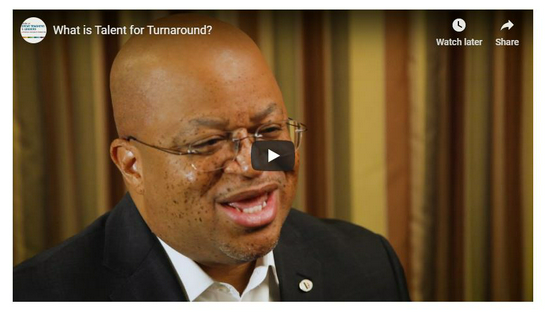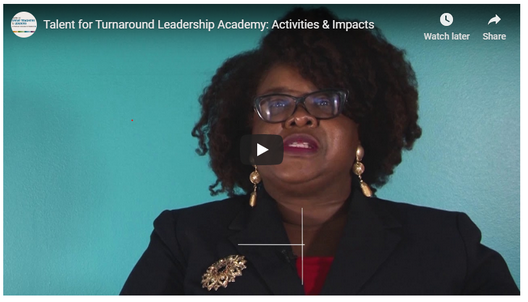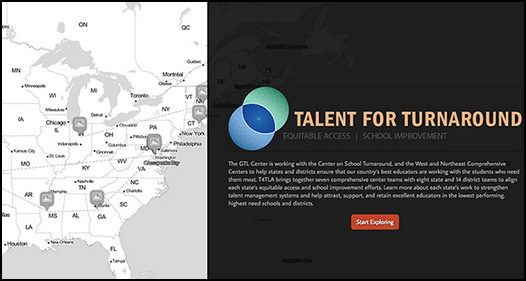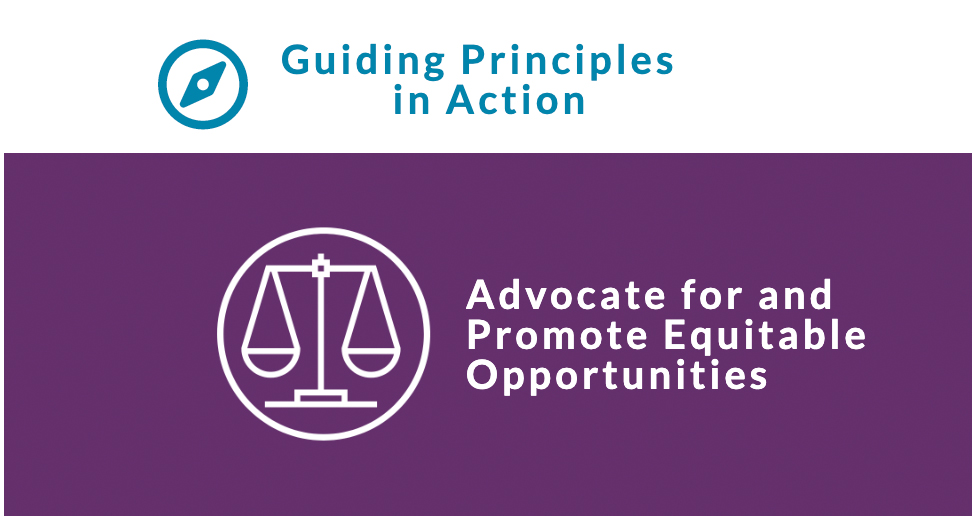Talent for Turnaround Leadership Academy
Talent for Turnaround Leadership Academy (T4TLA)
T4TLA was a three-year initiative (2016-2019) supporting seven states and 14 school districts in aligning their equitable access and school improvement efforts. T4TLA supported teams in identifying and implementing evidence-based, talent management strategies that attract, support, and retain excellent educators in the lowest performing, highest need schools and districts.
A Sample of Project Successes:
- Three districts in Arizona, Indiana, and Rhode Island saw retention rates for teachers in new or strengthened mentoring and induction programs rise from 50 to 100 percent.
- School leaders in Georgia and Arizona received additional supports and coaching for instructional leadership, helping them meet crucial school improvement goals.
- Districts in Indiana and Mississippi now have access evidence-based, state-wide resources for mentoring and induction.
The Challenge
After analyzing their human capital data, T4TLA states and districts across the board identified retaining great teachers and leaders in their lowest performing schools as their top talent management challenge.
Many T4TLA districts lose 50 percent or more of their teachers in their first 2-3 years in the classroom, creating a staffing churn that is costly, pulls down student achievement, and makes it difficult establish and sustain positive changes in school culture and climate.
The Opportunity
Under the T4TLA project, seven states and 14 school districts accessed a range of supports and technical assistance from the federally funded Comprehensive Center Network to address this shared challenge. Teams worked to bring focus on educator retention across their equitable access and school improvement efforts and used evidence-based strategies to design locally driven solutions.
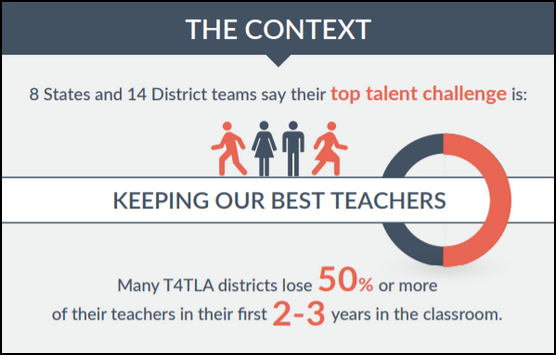
The Approach
Blended Learning. As part of T4TLA, teams participated in a blended learning technical assistance approach: it includes in-person, collaborative convenings with all teams and partners, and interim supports largely provided by regional centers at home in states and districts.
Continuous Improvement Process. Each state and district team engaged in a root cause analysis with stakeholders, data review, and evidence-based strategy selection process to develop an action plan for addressing their state and district's unique educator retention challenge. The teams also used monitoring and evaluation to strengthen their approach.
Evidence-based Strategies. Over the three years, each team designed, piloted, and implemented a range of evidence-based strategies, such as adopting or strengthening mentoring and induction programs, providing instructional leadership supports to school leaders, or creating district-wide policies and strategies for attracting and retaining talented educators.
The T4TLA project generated a multitude of supporting resources to build team's knowledge and capacity in talent management strategies. Access our resource archive to explore planning resources, presentations, and other materials produced as part of the three-year project.
T4TLA Blended Learning Technical Assistance Approach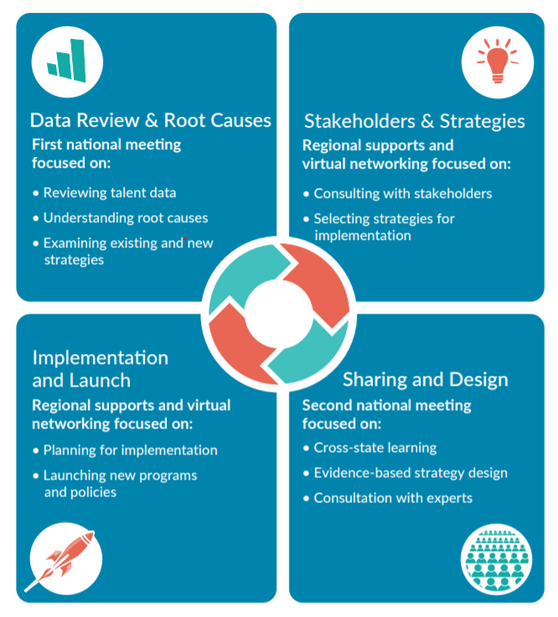
Download the T4TLA infographic and concept paper to learn more about the project's context and theory of action.
Project Outcomes
The continuous improvement process that each state team adopted in planning and implementing their action plans has yielded encouraging early results and, in several cases, provided program models and resources that states are using to scale-up evidence-based strategies to additional districts.
Explore our the content below to learn more about each team's project, their successes, and lessons learned.
Program Highlights
Click on each project highlight below to view the T4TLA Newsletter update for each project:
Video: T4TLA Activities and Impacts
Hear directly from team members in Indiana, Georgia, and Mississippi about their team's projects for improving teacher retention in high-need schools. Strategies highlighted include stronger mentoring and induction programs, improved instructional leadership supports for school leaders, and expanded professional learning opportunities for teachers.
StoryMap: A Quick Look at T4TLA State & District Projects
Looking for a quick, interactive way to learn about each state's T4TLA project? Click through our StoryMap to discover the hard work completed by each team.
Newsletter Archive
The T4TLA Steering Committee produced a quarterly newsletter highlighting the latest project updates and lessons learned from state and district participants. Access the newsletter archive to learn more about T4TLA state and district projects.
Guiding Principles in Action: Advocate for and Promote Equitable Opportunities
Too often, educator talent management strategies are not designed for or piloted in the highest need schools and districts. In schools that have fewer resources to tackle greater challenges, typical “best practice” strategies may fail if teams ignore how a high-needs context shapes school readiness in program design and implementation.
T4TLA was designed to ensure the project focused on district most in need of support. GTL Center project lead, Dana Chambers, notes:
"One of the things T4TLA did in a very purposeful way was identify districts for participation that were really struggling the most to close achievement gaps to turnaround their lower performing schools."
Through T4TLA, the GTL Center captured lessons learned from T4TLA teams about important considerations for designing mentoring and induction programs for high-need schools. Our team synthesized these considerations alongside the latest research in the GTL Center special issues brief, Flipping the Readiness Paradigm: Tailoring Programs to Address the Achievement Gap and Teacher Shortages in High-Need Schools. This brief offers practical guidance on modifications and additional supports states should consider for ensuring educator talent programs are designed to meet the needs of the educators, students, and schools disproportionately impacted by gaps in equitable access.
Client Perspectives
- "Our state is where it is now with mentoring and induction due to [T4TLA]—consistent and continual efforts to ensure we are building high-quality mentoring and induction templates that can be used by all."
- “We are now in that second year of our partnership with [the GTL Center] and the team brought a high level of attentiveness to our district's needs and nuanced understanding of our regional context, making it a true collaboration and thought partnership.”
- "Our district would not have had the resources or buy-in to start a mentoring and induction program without T4TLA."
- “This project has been one of the most exciting and rewarding experiences I have had the privilege of working on!"
- "At first, we were a little skeptical, but we trusted the process, and it was one of the best things we could have done."

Mississippi's T4TLA Team at the 3rd National Convening in 2018
Partners
Comprehensive Center Network Partners


